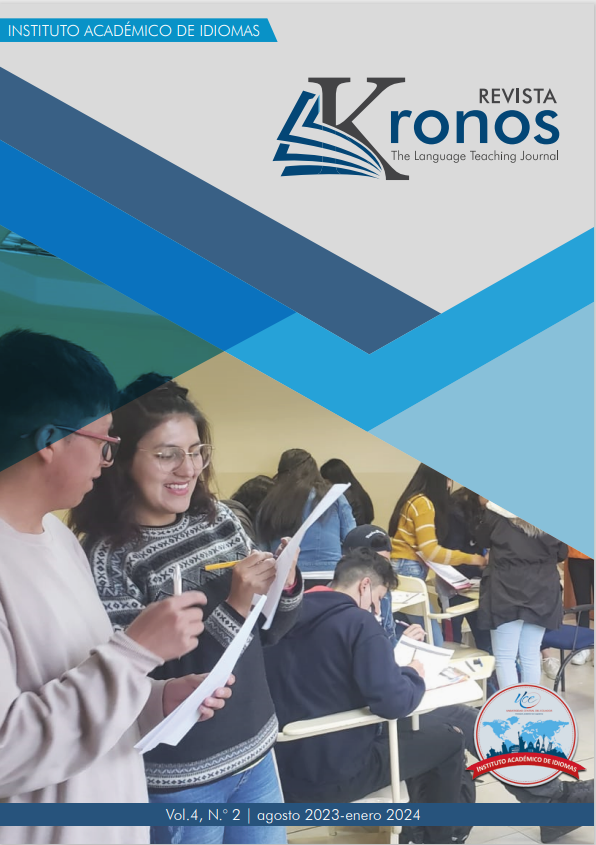Pilot testing of three English texts at the National University of Education
DOI:
https://doi.org/10.29166/kronos.v4i2.4755Keywords:
Textbook, evaluation, EFL, universityAbstract
This study aimed to compare three English textbooks to demonstrate their advantages and disadvantages in
an English as a Foreign Language (EFL) context and determine the best option to use. The three English textbooks used were Touchstone, English File, and Headway. The participants were 187 students from the National University of Education (UNAE) in Ecuador. This was a quasi experimental study where quantitative and qualitative data were collected.
A pre-test and post-test were administered to the students at the beginning and end of the study. In addition, a survey
was conducted with the students and a checklist was given to the teachers to collect quantitative data. A survey with
open-ended questions was used to gather qualitative data from the teachers. The results suggested that English File was the best option for our context because the students learned better and increased their English proficiency compared to the other two textbooks. Furthermore, the teachers agreed that the English File is more useful because it offers a variety of resources that reduce teachers' planning time.
Downloads
References
Chambers, F. (1997). Seeking consensus in coursebook evaluation. ELT Journal, 51(3), 29-35. Retrieved from https://eclass.uoa.gr/modules/document/file.php/ENL264/textbook%20evaluation.pdf
Consejo de Educación Superior. (2019). Reglamento de Régimen Académico, (111) 80, 1-53.
Cunningsworth, A. (1995). Choosing your coursebook. Oxford, England: Heinemann.
Gutiérrez Bermúdez, J. F. (2014). An exercise in course-book evaluation: Strengths, weaknesses and recommendations regarding New English File: Elementary. Latin American Journal of Content and Language Integrated Learning, 7(1), 98-111.
Retrieved from laclil.unisabana.edu.co/index.php/LACLIL/article/download/3870/pdf
Hutchinson, T., & Torres, E. (1994). The textbook as agent of change. ELT Journal, 48(4), 315-328. Retrieved from http://textbookuse.pbworks.com/f/Textbooks%2Bas%2Bagents%2Bof%2Bchange.pdf
Jones, S. (2009). A retrospective evaluation of a ELT coursebook for a Korean university conversation course. MA TESOL / TEFL Module 3. Retrieved from https://www.birmingham.ac.uk/Documents/college-artslaw/cels/essays/sylabusandmaterials/JonesSM.pdf
Latham Koenig, C., Oxenden, C., & Seligson, P. (2012). New English File. Oxford University Press.
Ley Orgánica de Educación Superior (2014). Quito, Ecuador. https://www.ikiam.edu.ec/documentos/normativa_externa/REGLAMENTO%20GENERAL%20A%20LA%20LEY%20ORGANICA%20DE%20EDUCACION%20SUPERIOR.pdf
Lisna, M. (2016). Retrospective evaluation of ELT coursebook effectiveness. Advanced Education, 6, (87-92). Retrieved from https://pdfs.semanticscholar.org/b535/ac83fbcdceb8678d37621a772d1bcd2c8e9d.pdf?_ga=2.149816566.1166380568.1562450581-315612324.1562450581
McDonough, J., & Shaw, C. (2003). Materials and methods in ELT (2nd ed.). Oxford, England: Wiley-Blackwell.
McDonough, J., Shaw, C., & Masuhara, H. (2013). Materials and methods in ELT: A teacher’s guide (3rd ed.). Oxford, England: Wiley-Blackwell.
Mukundan, J., & Ahour, T. (2010). A review of textbook evaluation checklists across four decades (1970-2007). In B. Tomlinson & H. Masuhara (Eds.), Research for Materials Development in Language Learning: Evidence for best practice (pp. 336-352). London, England: Continuum International Publishing
Mukundan, J., Hajimohammadi, R., & Nimehchisalem, V. (2011). Developing an English Language textbook evaluation checklist. Contemporary Issues in Education Research, 4(6), 21-28. Retrieved from
Mukundan, J., Hajimohammadi, R., & Nimehchisalem, V. (2011). Developing an English Language textbook evaluation checklist. Contemporary Issues in Education Research, 4(6), 21-28. Retrieved from https://clutejournals.com/index.php/CIER/article/view/4383/4471
Richards, J. C., & Renandya, W. A. (2002). Syllabus design and instructional materials. In J. C. Richards & W. A Renandya (Eds.), Methodology in language teaching: An anthology of current practice (pp. 65-68). Cambridge, England: Cambridge University Press. https://doi.org/10.1017/CBO9780511667190.011
Scrivener, J., Norris, R., Kerr, P., Jones, C., & Clandfield, L. (2012). Straightforward. Oxford: Macmillan Education.
Shahmohammadi, S. (2018). Textbook Evaluation: Looking at Prospect Series through Teachers’ Perspective. Research in English Language Pedagogy, 6(2), 182-204. Retrieved from http://relp.khuisf.ac.ir/article_542578.html
Tomlinson, B. (Ed.). (2003). Materials development in language teaching (2nd ed.). Cambridge, England: Cambridge University Press.
Tu, N. T., Trang, B. L., & Phuong, H. T. (2013). An Evaluation of the EFL English coursebook: American English File Multipack 2A &2B. Tạp chí KHOA HỌC ĐHSP
Wilson, W., & Barnard, R. (2017). Fifty-Fifty, Book 1: A Speaking and Listening Course (3rd ed.). Person Longman.
Published
How to Cite
Issue
Section
License
Copyright (c) 2023 Veronica Herrera Caldas, Jessica Ochoa, Carmen Morales, Axel Calle

This work is licensed under a Creative Commons Attribution-NonCommercial-ShareAlike 4.0 International License.












